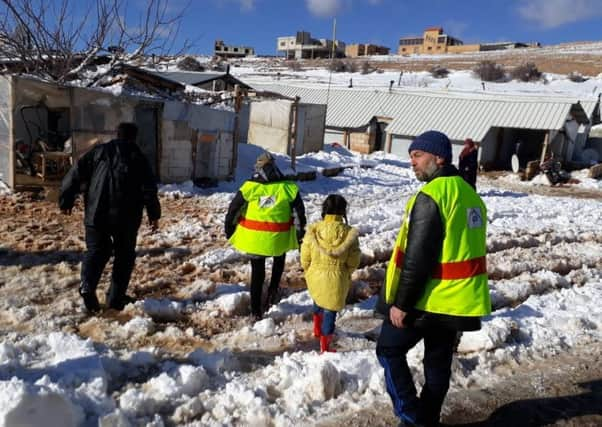Edinburgh-based charity leads relief work for Syrians in Lebanon


High up on the slopes of the Anti-Lebanon Mountains, the tarpaulin city formed just outside the small town of Arsal stretches out in front of her in every direction.
Blanketed in snow, families huddle around oil lamps inside their tented shelters as howling blizzards bring freezing conditions to this usually arid desert landscape.
Advertisement
Hide AdAdvertisement
Hide AdOver the past five years, Arsal’s population has swelled from the usual 35,000 to almost 100,000 as refugees displaced by conflict in neighbouring Syria seek refuge from the anarchic scenes back home.
Situated around 80 miles from Beirut and 5,000 metres above sea level – higher than the summit of Ben Nevis – the town already makes for difficult living conditions, but temperatures have plummeted over the past few months from around 35C to an average of -10C.
As field project manager for Granton-based charity Edinburgh Direct Aid (EDA), Maggie has made several trips to the camp to co-ordinate the relief effort and lead the distribution of supplies donated by generous Capital residents more than 3,000 miles away.
But this year, with the town brutally battered by effects of Storms Norma and Miriam, transporting provisions to those in desperate need has become a much more challenging task.
Advertisement
Hide AdAdvertisement
Hide AdOver the past few weeks, the storms have brought torrential rain, leading to record levels of flooding in the region, as well as 30mph winds and heavy snowfall.
Speaking from the camp, Maggie, 68, said: “These are just absolutely miserable conditions. You have around 7500 families ploughing through mud, rainwater and snow.”
“One morning we visited some camps not far from the centre to get an idea of how people were managing after last week’s storm. Some of the snow had cleared from the main paths through the camps, but a muddy quagmire of filthy slush had to be negotiated by all those wanting to bring in food supplies.”
Officially, Lebanon hosts more than a million refugees from the Syrian conflict. However, it is estimated 1.5 million are actually in the country.
Advertisement
Hide AdAdvertisement
Hide AdHowever, the Lebanese government has previously outlawed the construction of concrete houses by Syrian refugees as they are only provided with a temporary stay, meaning living conditions are fraught with danger.
“Families have to keep the stove on 24 hours a day or they will freeze to death,” Maggie explains.
“Most of the tents here have babies or very young children, so it is dangerous if the oil runs out.”
She continued: “But then the problem is, when the snow comes, you get about five inches falling on top, so the risk of the roof collapsing, with the stove going inside, it is extremely dangerous.”
Advertisement
Hide AdAdvertisement
Hide Ad“Some of the tents have become like prisons. Their entrances have been completely blocked by snow and some had to tunnel their way out. The pressure of heavy snow on the flimsy walls had all but collapsed some of them and a few families had sought shelter in other more sturdy tents.”
Forecasts for the next week show little improvement in conditions, with blizzards and heavy rainfall predicted.
At least four people have died in refugee camps across the region as a result of the storms, including an eight-year-old girl who fell into a flowing river in the northern town of Minyeh.
Since 2013, EDA has taken more than 30 tonnes of donations to Arsal, bringing everything from clothes and medicine to sewing machines and mobile phone repair kits.
Advertisement
Hide AdAdvertisement
Hide AdLast week, volunteers at the charity’s Granton warehouse loaded up the first shipping container to be sent to the town.
Donations can be made to its Granton warehouse and with no upper limit on the amount it can transport, the charity is also putting out the call for volunteers to help sort and pack the items.
Padded jackets, fleeces, thermals and basic medical supplies such as painkillers, plasters and disinfectants are all highly requested.
“Everything people donate makes such a difference,” Maggie said.
“People don’t even think about what they are donating, but it all does really help. It could be the difference between life and death for the people in these conditions.”